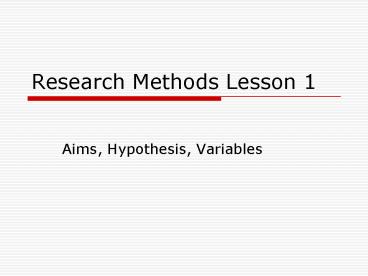Research Methods Lesson 1 - PowerPoint PPT Presentation
Title:
Research Methods Lesson 1
Description:
Research Methods Lesson 1 Aims, Hypothesis, Variables Formulating Research Questions Research starts with a research question, something that the psychologist wants ... – PowerPoint PPT presentation
Number of Views:118
Avg rating:3.0/5.0
Title: Research Methods Lesson 1
1
Research Methods Lesson 1
- Aims, Hypothesis, Variables
2
Formulating Research Questions
- Research starts with a research question,
something that the psychologist wants to find
out. E.g. - What makes some people more obedient than others?
- Because there are so many different reasons,
research must be carried out.
3
Formulating Aims
- It would be difficult to investigate all the
different aspects at once so an aim would focus
on one factor. - For example the investigator may focus on
confidence levels. - To investigate whether a persons confidence
level has an effect on the likelihood of them
obeying.
4
Formulating Hypotheses
- The aim is based on a theory and the theory
should lead to predictions. - A prediction may be that people who are more
confident may be less obedient. This doesnt
constitute a hypothesis yet, as the variables we
are testing need to be operationalised.
5
Operationalise
- In the example there are 2 variables
- Confidence
- Likelihood of obeying
- The psychologist may test confidence with a
questionnaire and likelihood of obeying by
observing whether the same participants obey an
unreasonable request.
6
Research Hypothesis (precise prediction) H1
- Participants who score above average on a
questionnaire measuring confidence are
significantly less likely to follow an
unreasonable request made by a stranger in
uniform compared to participants who score below
average.
7
Carrying out the study
- The psychologist would test their hypothesis by
collecting data. If the results support the
hypothesis then this is accepted, however if the
research provides no backup for the prediction
then this must be rejected.
8
Null Hypothesis H0
- As it is possible that the H1 may be rejected, a
psychologist must formulate a null hypothesis. - There is no significant difference in the number
of times participants follow an unreasonable
request from a stranger in uniform whether they
score below or above average on a questionnaire
measuring confidence.
9
Correlation
- So far the hypotheses in this PPT have predicted
difference. There are also correlation studies.
These test for relationship between variables. - There is a significant correlation between
participants scores on a self-esteem test and on
the number of friends they have.
10
IVs and DVs
- There are 2 types of variable as we have already
stated, however these are completely different to
each other. - Independent Variable this is the variable that
the psychologist manipulates. - Dependent Variable this is the variable that the
psychhologist measures.
11
Previous example
- Participants who score above average on a
questionnaire measuring confidence are
significantly less likely to follow an
unreasonable request made by a stranger in
uniform compared to participants who score below
average. - Where is the IV and DV?































